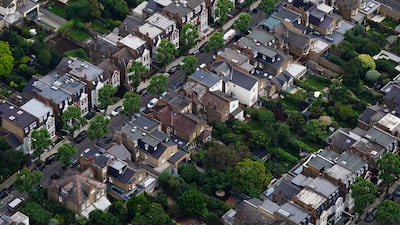Signs of serious cooling in the UK housing market emerged on Monday, as the Bank of England said there had been another drop in mortgage approvals in September.
Net approvals for house purchases, an indicator of future borrowing, fell from 45,400 in August to 43,300 in September, the lowest level since January 2023.
Net approvals for remortgaging, which only applies to remortgaging with a different lender, fell to 20,600 in September, down from 25,100 in August, and to the lowest level since January 1999.
Meanwhile, the Bank of England also announced the "effective" interest rate, the actual interest paid to lenders, on newly-drawn mortgages rose by 1.9 percentage points to 5.01 per cent in September.
"The property market appears to have entered hibernation mode until the spring," Stephen Perkins, managing director at Yellow Brick Mortgages, told Newspage.
"However, there has been plenty of activity on the remortgage front as people seek to minimise the drastic increase in payments due to the skyrocketing base rate over the past 12 months.
"These figures show that many people are sticking with their existing lenders and in many cases that is because they have no other choice. The market won’t pick up substantially until the property market’s alarm clock goes off early in 2024."

Cost-of-living crisis
Also on Monday, a survey from the pensions and investments mutual Royal London found nearly a quarter of people have raided their savings pots as a direct result of the cost-of-living crisis.
The average amount withdrawn from savings accounts to meet the cost of rising bills was £2,623, according to the survey.
However, while the amount of money going into savings accounts has increased in recent months because of rising interest rates, 16 per cent of people told the survey they intend to cover future rising bills with money from their short-term savings.
Around a fifth of people surveyed said they had less than £100 in savings.

Thursday decision
All eyes now turn to the Bank of England's Monetary Policy Committee (MPC), which will announce the results of its latest deliberations on interest rates on Thursday.
The MPC has increased interest rates from 0.1 per cent in December 2021 to 5.25 per cent in August, while leaving rates on hold in September.
Many economists believe the Bank of England will leave interest rates at 5.25 per cent on Thursday, as the spectre of a possible recession begins to loom.
"Overall, higher rates are gradually working and this supports our view that the bank has finished hiking interest rates," said Ashley Webb, an economist with Capital Economics.
"Looking ahead, our forecast that the bank won't cut interest rates until late next year suggests that lending will remain weak over the next few quarters."
Susannah Streeter, head of money and markets, Hargreaves Lansdown, said the economy was "flatlining" and growth was still "very elusive".
"Fresh weakness in the housing market, with prices continuing to fall, affects people's perceptions of their wealth – and with house moves on hold, it won't encourage spending on renovations and interior decor.
"If wage growth and goods and services price increases keep heading down, it'll make policymakers more adverse to another hike.
"But given the stop-start nature of the downwards march of inflation and its very stubborn tendencies, any cut still doesn't look likely until the second half of next year, particularly with oil prices remaining elevated among geopolitical tensions."


